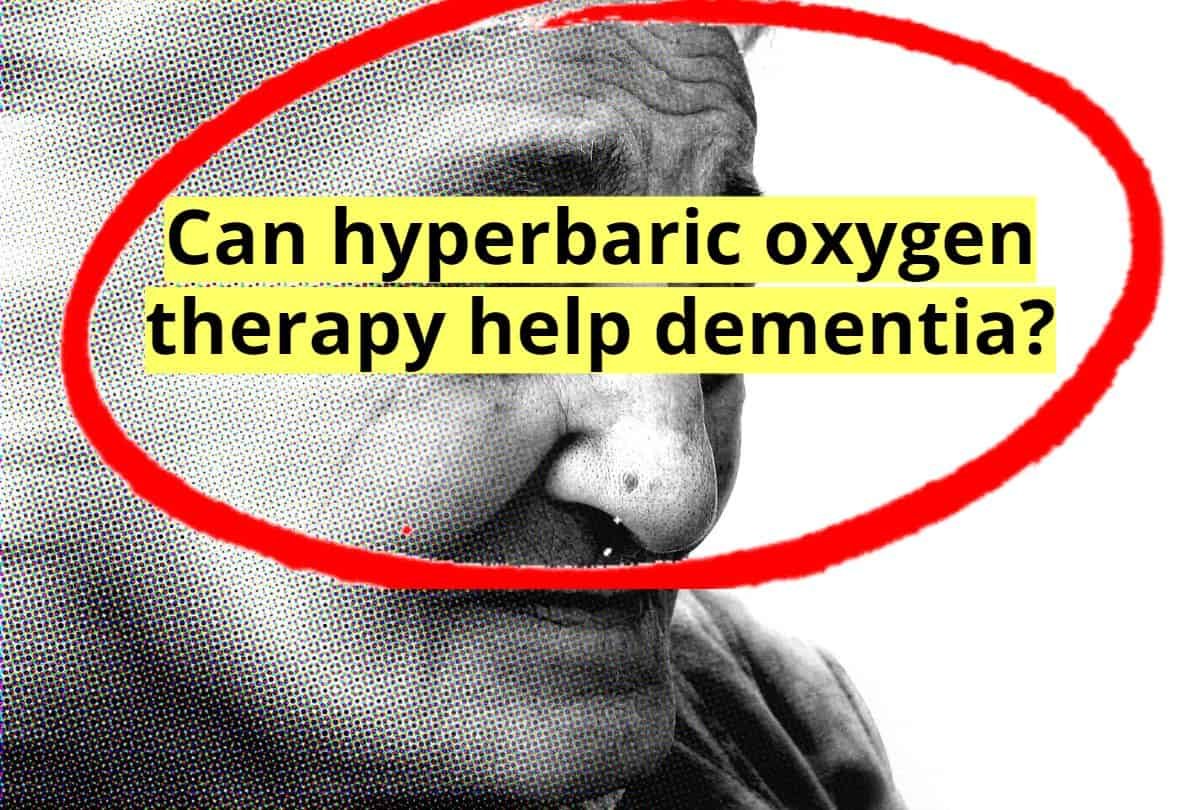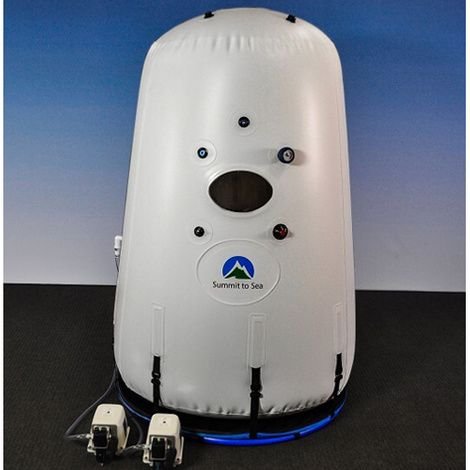Can hyperbaric oxygen therapy help dementia?

Dementia is a group of symptoms that affects a person’s ability to think, remember, and carry out daily activities. It’s a progressive condition that can be distressing for both the person affected and their loved ones.
While there is no cure for dementia, various treatments and therapies are being explored to slow its progression and improve quality of life. One such therapy is hyperbaric oxygen therapy (HBOT).
In this article we are going to explore if hyperbaric oxygen therapy or HBOT in short can help with dementia by looking at what the scientific community has to say about this subject.
Can hyperbaric oxygen therapy help dementia?
HBOT involves breathing pure oxygen inside a pressurized chamber, which increases the amount of oxygen in the body. This increased oxygen supply is believed to stimulate brain function and improve blood flow, which in turn may slow the progression of dementia.
A number of studies have explored the potential benefits of HBOT for people with dementia. Let’s take a look at some of them.
Hyperbaric Oxygen Therapy for the Treatment of Alzheimer’s Disease: A Review of Clinical and Experimental Studies
In a research study published in the Journal of Alzheimer’s disease, the effectiveness of hyperbaric oxygen therapy (HBOT) in treating Alzheimer’s disease was reviewed.
The study included 391 articles that were searched between 1980 and 2021 using the key words ‘hyperbaric oxygen therapy’ and ‘Alzheimer disease’.
The results of clinical and experimental studies suggest that HBOT may be an effective treatment for Alzheimer’s disease.
However the researchers concluded that more research is needed to determine the most effective treatment protocol for long-term cognitive health of Alzheimer’s patients. The study advocates for further research into the use of HBOT as a treatment option for Alzheimer’s disease.
A Promising Alternative Therapy for Alzheimer’s Disease and Mild Cognitive Impairment
In another study published in the journal “Alzheimer’s & Dementia“, the effectiveness of hyperbaric oxygen therapy (HBOT) for people with Alzheimer’s disease (AD) and mild cognitive impairment (aMCI) was investigated.
Mild cognitive impairment (aMCI) is type of cognitive decline that is considered to be a mild form of Alzheimer’s disease, but not yet severe enough to be diagnosed as dementia. People with aMCI have memory problems that are noticeable, but do not interfere with daily life.
The study included 42 AD patients, 11 aMCI patients, and 30 control AD patients. The AD and aMCI patients were treated with 40 minutes of hyperbaric oxygen once a day for 20 days, while the control AD patients did not receive this treatment.
The patients were assessed using various neuropsychiatric assessments. The results showed that after one course of hyperbaric oxygen treatment, cognitive function improved significantly in AD and aMCI patients as assessed by MMSE and MoCA.
In comparison to the control AD patients, the MMSE and MoCA scores of hyperbaric oxygen treated AD patients were significantly improved after one month.
The study also found that hyperbaric oxygen treatment improved brain glucose metabolism in some of the AD and aMCI patients. The study concluded that hyperbaric oxygen treatment may be a promising alternative therapy for AD and aMCI.

Hyperbaric Oxygen Therapy Reduces Amyloid Burden and Improves Cognitive Function in Alzheimer’s Disease and Aging
In a study published in the scientific journal “Aging“, the team of Israeli doctors investigated the effects of hyperbaric oxygen therapy (HBOT) on Alzheimer’s disease (AD) and aging.
They used 5XFAD mice, a well-known AD model, and exposed them to HBOT. The results showed that HBOT increased the diameter of blood vessels and blood flow in the brain, reducing hypoxia.
Hypoxia refers to a condition in which the body or a part of the body is not receiving an adequate supply of oxygen. In the context of the study, it refers to a reduced amount of oxygen reaching the brain.
It also reduced the amount of amyloid plaques and improved the behavior of the mice. The team also applied HBOT to elderly patients with memory loss and observed increased blood flow and improvement in cognitive function.
Overall, the researchers concluded that HBOT may be effective in treating hypoxia-related neurological conditions such as AD and aging.
HBOT: A Promising Complementary Treatment for Vascular Dementia – A Meta-Analysis
A recent meta-analysis was published in the “Frontiers in Aging Neuroscience” journal to evaluate the efficacy and safety of hyperbaric oxygen therapy (HBOT) for the treatment of Vascular Dementia (VD).
The study looked at 25 randomized clinical trials with over 1,900 patients and compared the effects of HBOT in combination with different treatments to the effects of the same treatments without HBOT.
The results showed that HBOT improved scores on mental state exams, activities of daily living, and increased the overall effectiveness rate, while the rates of adverse events were not statistically different between the HBOT and control groups.
Overall, the study concluded that HBOT can be recommended as an effective and safe complementary therapy for VD treatment.
KEY TAKEAWAY
HBOT, when combined with other treatments, improves cognitive function and daily living activities on people with dementia and Alzheimer’s disease, without any significant adverse events.
What is Dementia?
Dementia is a brain condition that affects a person’s thinking, memory, and ability to perform everyday tasks.
It’s a progressive condition, meaning it gets worse over time, and can be very distressing for the person affected and their loved ones. Some common symptoms of dementia include memory loss, difficulty communicating, trouble with problem solving, and changes in mood and behavior.
There is currently no cure for dementia, but there are treatments and therapies available to slow its progression and improve quality of life for those affected.
What causes dementia in humans?
There are many different factors that can cause dementia in humans. Some of the most common causes of dementia include:
- Alzheimer’s disease: This is the most common cause of dementia, and it’s characterized by the gradual build-up of amyloid protein in the brain, leading to the death of brain cells and the decline of mental function.
- Vascular dementia: This type of dementia is caused by problems with the blood vessels that supply the brain, such as strokes, high blood pressure, or atherosclerosis.
- Lewy body dementia: This is a type of dementia caused by the presence of Lewy bodies, which are protein deposits, in the brain. It can cause a decline in mental function, as well as movement problems and visual hallucinations.
- Parkinson’s disease: Parkinson’s disease is a degenerative brain disorder that can cause dementia as the disease progresses.
- Frontotemporal dementia: This is a type of dementia that typically affects the front and sides of the brain, causing changes in personality and behavior, as well as problems with language and decision-making.
- Traumatic brain injury: Repeated head injuries, such as those sustained in contact sports, can increase the risk of developing dementia later in life.
How can dementia be avoided?
Well, there’s no guaranteed way to prevent dementia, but there are some lifestyle choices and habits that might help lower your risk. Here are a few things that research suggests could be helpful:
- Exercise regularly: Regular physical activity has been linked to a reduced risk of dementia.
- Stay mentally and socially active: Keeping your brain and social connections active could help keep your mind sharp.
- Eat a healthy diet: A diet that’s rich in fruits, vegetables, and whole grains and low in sugar, saturated fat, and processed foods might help reduce your risk of dementia.
- Don’t smoke: Smoking increases the risk of many health problems, including dementia.
- Keep your blood pressure and cholesterol under control: High blood pressure and cholesterol are risk factors for a number of health problems, including stroke and heart disease, and they have also been linked to an increased risk of dementia.
These are just a few examples, and it’s important to remember that not everyone who follows these tips will avoid dementia, but it can’t hurt to take steps to live a healthy life.
Is Dementia the same with Alzheimer’s disease?
No, dementia is not the same as Alzheimer’s disease. Dementia is an “umbrella term” that refers to a group of symptoms associated with a decline in memory and thinking skills.
Alzheimer’s is the most common type of dementia and accounts for 60-80% of all dementia cases. It is a progressive disease that destroys memory and thinking skills over time.
So, while Alzheimer’s is a type of dementia, not all forms of dementia are Alzheimer’s. There are other types of dementia as well, such as vascular dementia, Lewy body dementia, and frontotemporal dementia, to name a few.
Bottom Line
The bottom line is that while some studies have suggested it could be an effective complementary therapy for treating vascular dementia, more research is needed to determine its efficacy and safety.
The meta-analysis we talked about earlier as well as the other research studies, showed some promising results, with HBOT improving mental and physical functioning in patients with Dementia, Alzheimer and other brain injuries, but it’s important to keep in mind that this is just one study and more evidence is needed to fully understand the effects of HBOT on dementia.
Read Also
